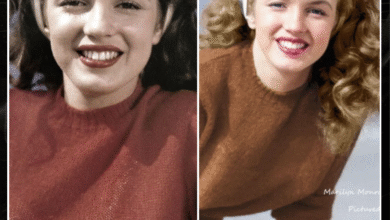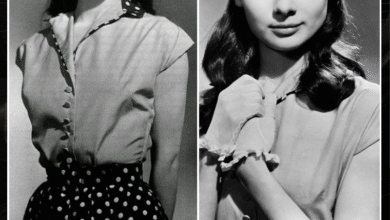Marilyn Monroe’s Secret Career Shaker: The Film That Nearly Destroyed Her—But Ultimately Transformed Her Legacy
OPINION: This article may contain commentary which reflects the author's opinion.
Marilyn Monroe’s career is one of the most celebrated in Hollywood history. From her rise as a sex symbol in films like Gentlemen Prefer Blondes (1953) and Some Like It Hot (1959) to her tragic early death, Monroe’s life was filled with both public adoration and private struggles. Yet, it was in the final years of her career, particularly in her 1961 film The Misfits, that Monroe’s legacy was both profoundly shaped and, in some ways, sealed as a symbol of personal struggle and artistic depth.
A Career Shaped by Struggles and Triumphs
Monroe’s career began in the 1950s when she quickly rose to fame, captivating audiences with her charm, beauty, and comedic timing. However, beneath the glamour of her public persona, Monroe faced immense personal challenges, including emotional exhaustion, turbulent relationships, and battles with mental health. These struggles would become intertwined with her professional life, often influencing her performances and the roles she chose.
By the time she filmed The Misfits, Monroe’s career had begun to shift. She had become more than just the “blonde bombshell” she was initially known for, pushing herself to take on more serious roles and challenging herself as an actress. Directed by John Huston and written by her then-husband Arthur Miller, The Misfits was not only Monroe’s last completed film but also a profound reflection of her personal and professional struggles.
The Story of The Misfits: An Overlooked Masterpiece
The Misfits, released in 1961, centers on a group of people in Nevada, struggling with personal disillusionment and isolation. Monroe plays Roslyn, a recently divorced woman trying to find her place in a world that seems indifferent to her needs and desires. She’s drawn into the lives of a group of aging cowboys, portrayed by Clark Gable, Montgomery Clift, and Eli Wallach, and together, they explore themes of loneliness, yearning, and emotional survival.
Though initially a commercial failure, The Misfits has since been hailed as one of Monroe’s most important works. It has been described as “startling, heartfelt, and gorgeous work” that felt almost like an elegy for Monroe herself. Critics have since come to view it as her best performance, with Monroe’s raw vulnerability shining through as she portrayed a character grappling with the weight of her emotional isolation.
The Personal Struggles Behind the Film
The making of The Misfits was marked by personal turmoil for Monroe, most notably her crumbling marriage to Arthur Miller. Their relationship, once filled with promise, had begun to disintegrate during the production of the film, culminating in their divorce in 1961, shortly after filming ended. Monroe’s personal struggles with loneliness, self-worth, and identity mirrored those of her character, making the film an intensely personal project for the actress.
Monroe herself has been quoted as saying that her role in The Misfits reflected the loneliness she often felt in her own life, a theme that runs deeply throughout the film. Critics have described the movie as “strangely like an elegy,” capturing Monroe’s own sense of sadness and emotional exhaustion. The film’s themes of isolation and yearning resonated with Monroe’s life at the time, making it a poignant and cathartic project for her.
A Film That Was Initially Overlooked
When The Misfits was released, it did not achieve the commercial success that Monroe’s previous films had. Despite its star-studded cast and the emotional depth of the story, it failed to make a significant impact at the box office. At the time, it was seen as a departure from the kind of roles Monroe had been typecast in, and critics were not as receptive to the film as they had been to her earlier comedic work.
However, over time, the film has gained recognition as a masterpiece of American cinema, with many modern critics acknowledging it as one of Monroe’s most significant and underappreciated works. The film has come to symbolize the end of an era for Monroe, as it marked the last time she would appear in a film of such emotional and artistic depth.
The Legacy of The Misfits and Monroe’s Career
While The Misfits was a box-office failure, it marked a turning point in Monroe’s career. It allowed her to show a different side of her acting talent, one that was more complex and nuanced than the roles that had brought her fame. This shift in her acting style and the personal reflection it brought was deeply significant for Monroe, as it helped her reclaim some control over her career during a time of immense personal difficulty.
The film also served as a reflection of the internal battles Monroe faced, making it not only a career-defining moment but also a piece of work that contributed to her legacy as a symbol of both strength and fragility. Despite its initial failure, The Misfits is now considered an important film in Monroe’s filmography, offering a glimpse into the emotional depth and complexity of the actress beyond her glamorous on-screen persona.
Conclusion: An Overlooked Masterpiece That Changed Her Life
In conclusion, The Misfits stands as a pivotal moment in both Marilyn Monroe’s career and personal life. Though initially overlooked and underappreciated, the film has since been recognized as a masterpiece that allowed Monroe to showcase her full acting range, touching on themes of loneliness and self-doubt that mirrored her own experiences. More than just a film, The Misfits was a reflection of Monroe’s personal journey, offering an emotional and artistic closure to an iconic, though tumultuous, career. It remains an essential part of Monroe’s legacy, forever cementing her place as not only a Hollywood icon but also a deeply human figure whose struggles continue to resonate with audiences today.



